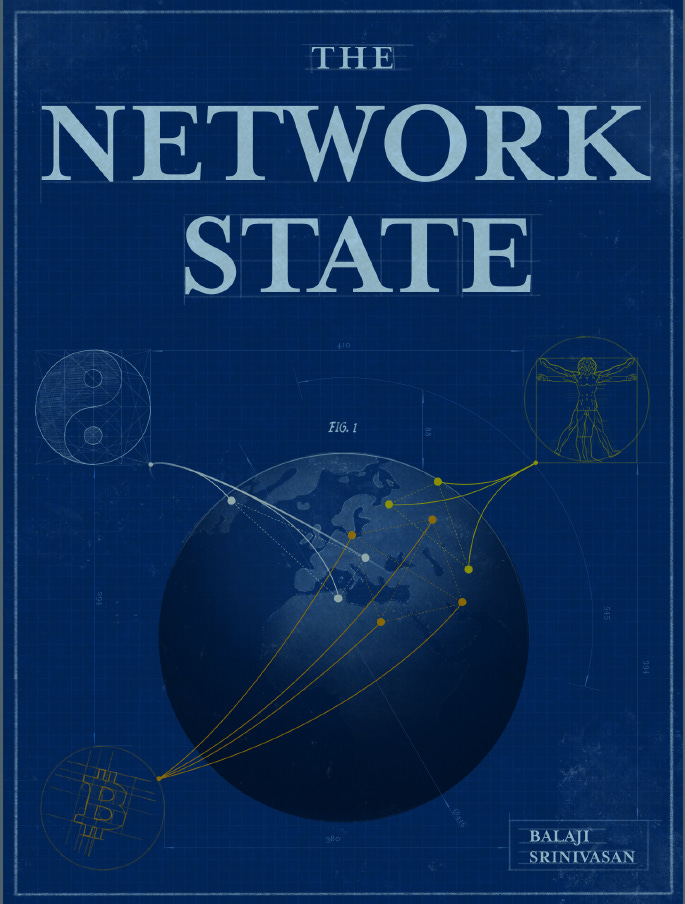#18: EXIT and The Network State
Balaji Srinivasan believes that the nation-state — a state representing a particular ethnos within defined geographic borders — is on its way out. Communications technology has allowed us to develop tight, tribe-like affinities scattered across the planet, while alienating us from our geographic neighbors.
In a sense, the dream of the early internet is here: the ability to see and befriend foreigners really has made state rivalries less salient. What 90s techno-optimists failed to imagine was how the internet would deepen and aggravate cultural rivalries, by forcing the stench of Enemy behaviors and attitudes right under our noses. In other words, we’ve traded arbitrary, vague prejudices for a much purer and better-informed loathing.
Balaji’s solution is to lean into this emerging tribalism.
The Network State formalizes these affinity groups so that they can act in their members’ common interest, in the way that nation-states previously did (at least in theory). He imagines these groups growing in numbers and influence to the point that they can credibly obtain diplomatic recognition from existing states as the international system loses coherence.
The proposed Network State begins as a group chat, then develops into a “network union” — a community with features of an online labor union/guild/fraternity/mutual aid society. Members build trust and capacity within the group, then begin to act collectively to achieve shared goals. Members eventually crowdfund property, enabling members to gather and collaborate in the physical world. Then it gets a little fuzzy, and web3 is involved, and then these organizations become recognized states, presumably with the traditional suite of legislative and judicial powers.
He recommends organizing the community around One Commandment.
The One Commandment is a single maxim that differentiates the network from the broader society — as a protection against utopian theorycel models that try to reinvent everything all at once, introducing too many potential points of failure.
Reading this helped me to clarify exactly what we’re doing here. I don’t necessarily care about “cancel culture” in itself; I care that the instruments of social coercion are being deployed to disrupt the basic function of society: the formation of healthy families. Our “one commandment” is to build for grandchildren.
As you can imagine, it was pretty exciting to see a straightforward history of EXIT written in the pages of someone else’s book.
We’re coming up on step four out of seven (“crowdfund physical nodes”), and I wrote YOU ARE HERE in big letters on the page. I think Balaji is basically right that people’s online tribal commitments are going to intensify and formalize, at least to the extent that we have done (in fraternal organizations or guilds).
The book is a little handwavey about how these organizations will acquire the kind of power he imagines without provoking an immune response from the existing territories that they will occupy. He indicates that the power of these groups will be established by a cryptographically verified census, which would enable them to credibly endorse political candidates with the promise/threat of bloc voting, etc. Maybe that works at the local scale, where election tampering is less feasible — but any direct confrontation with Our Democracy is likely to be more trouble than it’s worth for the foreseeable future.
The good news is that you don’t need to pursue that kind of confrontation to exercise collective power.
If you know where to find a better job, you don’t have to worry about what your local HR mandarin thinks of your Twitter account. If you can get funding to start up a small business, you don’t have to worry about whether a venture capital fund thinks you’re a Values Fit. If you’ve got access to a great local homeschool co-op or a boys’ outdoor club, you don’t have to worry about your children being weaponized against you for noncompliance.
The point of all this is not to permanently withdraw from these institutions, but to develop power in quiet ways, so that when it’s time to push back directly, it’s as straightforward and inevitable as sitting King John down to sign the Magna Carta.
But quiet power expands geometrically as the network grows, just like overt political power. Easier to find a job with your fellow members if there are hundreds in your city. Easier to get the homeschool co-op together if it’s a ten-minute drive instead of 45.
A larger union would certainly be stronger, if you can maintain asabiyyah and clarity of vision at scale. Facebook is a transnational organizations that nominally commands a membership of billions, and that in itself is powerful, but there’s almost no vision and even less commitment.
But imagine a group with ten thousand members, so that you’ve got a local chapter with 150-200 members in every major metro in America.
Each of these members is individually vetted by the chapter head for their quality and commitment. It’s just a good group of guys to do business with, a good group of families to introduce your wives and children to; but we’re also actively working together to build alternative institutions and networks that strengthen your hands against HR mandarins, public school bureaucrats, journalists, and other regime functionaries. And when trouble comes — from a doxxing to a layoff to a natural disaster to civil disorder — you know exactly who to call and what to do about it.
Balaji is right that it has to start online first, but we also have to grow in scale so that meeting up with nearby members is just a quick trip into town, rather than a plane ticket. So far, EXIT has three clusters with the density to support convenient regular contact: Austin/Houston, Utah Valley, and DC/Philadelphia. Once a month, we hold meetups in these and other cities, that will be the seedbed for local chapters.
There are more than enough like-minded people to build this kind of power, if we can find each other, trust each other, and organize. If you want to get involved, sign up at exitgroup.us.





